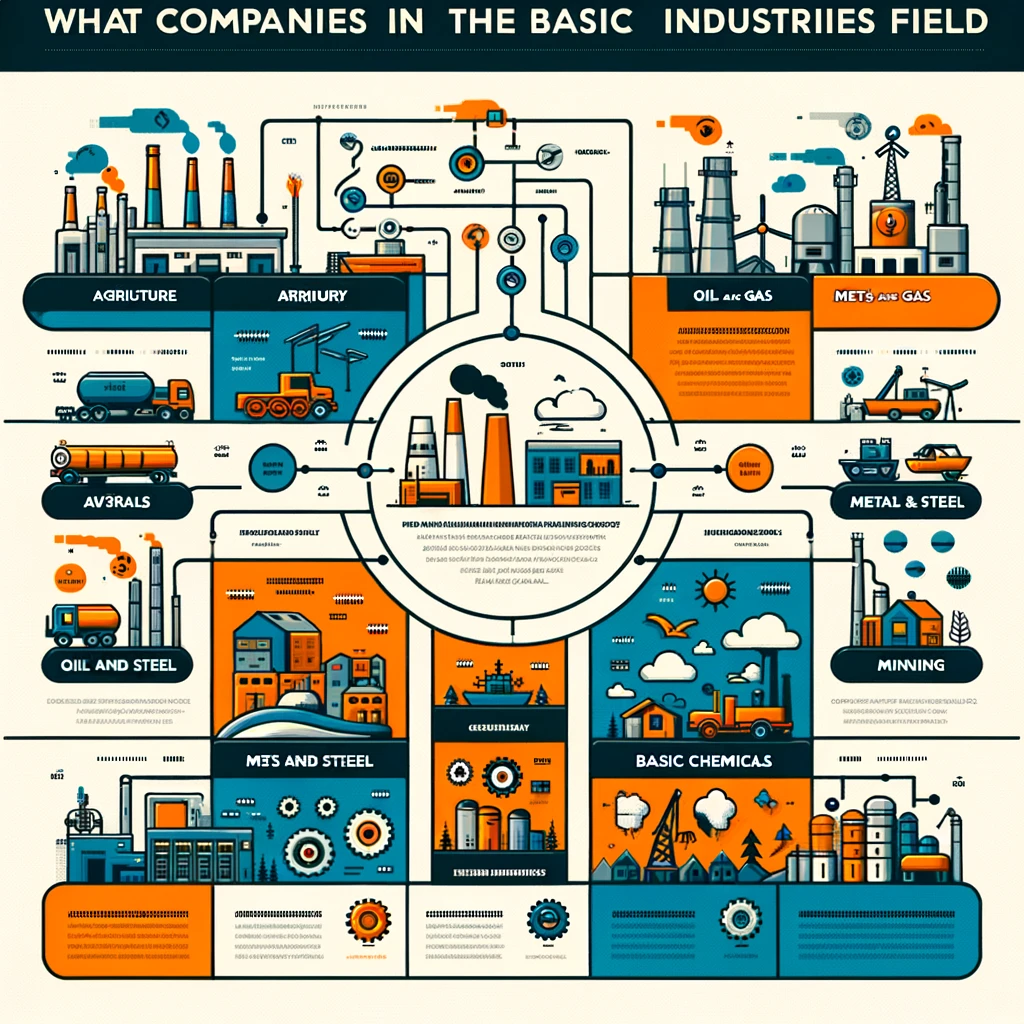Table of Contents
- Introduction
- Understanding Basic Industries
- Core Segments in Basic Industries
- 3.1 Agriculture
- 3.2 Oil and Gas
- 3.3 Metals and Steel
- 3.4 Basic Chemicals
- 3.5 Mining
- Leading Companies in Basic Industries
- 4.1 Metals and Steel Processing
- 4.2 Chemicals
- 4.3 Oil and Gas
- 4.4 Mining
- Common Features of Companies in Basic Industries
- FAQs
1. Introduction
Understanding what companies are in the basic industries field is crucial for anyone looking to invest, work, or collaborate with these foundational sectors. Basic industries, also known as primary industries, provide the raw materials and energy resources essential for other industries to function.
2. Understanding Basic Industries
Basic industries are integral to the economy, as they supply raw materials like minerals, metals, and energy resources. These industries form the backbone of the production supply chain, providing inputs necessary for manufacturing and other sectors.
3. Core Segments in Basic Industries
3.1 Agriculture
Agriculture is the cornerstone of basic industries, providing essential food and raw materials. The agriculture sector includes the cultivation of crops and the production of livestock, contributing significantly to the economy.
- Key Products: Wheat, corn, soy, poultry, dairy
- Economic Contribution: Billions in annual revenue
- Geographical Focus: Predominantly in the Midwest USA
3.2 Oil and Gas
The oil and gas sector is vital for energy production. It is divided into three main segments: upstream, midstream, and downstream.
- Upstream: Exploration and extraction of oil and gas
- Midstream: Transportation and storage of raw materials
- Downstream: Refining and processing into usable products
3.3 Metals and Steel
Metals and steel are crucial for construction and manufacturing. This segment includes the production and processing of iron, copper, aluminum, and steel.
- Key Processes: Casting, forging, extrusion, rolling, fabrication
- Products: Construction beams, machine parts, precious metals
3.4 Basic Chemicals
The chemicals sector produces essential compounds used across various industries. This includes petrochemicals, fertilizers, and organic and inorganic chemicals.
- Segments: Petrochemicals, fertilizers, organic chemicals, inorganic chemicals
- Applications: Agriculture, water treatment, manufacturing
3.5 Mining
Mining involves extracting valuable minerals and ores from the earth. This includes metals like iron and precious stones like diamonds.
- Key Products: Iron ore, coal, gold, silver, diamonds
- Economic Impact: Highly profitable with significant capital investment
4. Leading Companies in Basic Industries
4.1 Metals and Steel Processing
1. Nucor
- Location: Charlotte, North Carolina, USA
- Revenue: $39.729 billion
- Employees: 28,800
- Key Products: Steel beams, plates, wire mesh
2. U.S. Steel
- Location: Pittsburgh, Pennsylvania, USA
- Revenue: $20.301 billion
- Employees: 24,540
- Key Products: Pipes, tubes, sheet steel
3. Wheaton Precious Metals
- Location: Vancouver, Canada
- Revenue: $1.06 billion
- Employees: 41
- Key Products: Gold, silver, palladium
4. Vale SA
- Location: Rio De Janeiro, Brazil
- Revenue: $41.461 billion
- Employees: 64,516
- Key Products: Iron ore, nickel
5. Cleveland-Cliffs Inc
- Location: Cleveland, Ohio, USA
- Revenue: $22.329 billion
- Employees: 27,000
- Key Products: Iron ore, steel
4.2 Chemicals
6. Dow Chemical Company
- Location: Midland, Michigan, USA
- Revenue: $53.489 billion
- Employees: 37,800
- Key Products: Polymers, plastics, agricultural products
7. LyondellBasell Industries Holdings
- Location: Houston, Texas, USA
- Revenue: $47.541 billion
- Employees: 19,300
- Key Products: Polyethylene, polypropylene
8. Momentive Performance Materials Worldwide LLC
- Location: Waterford, New York, USA
- Revenue: $480.9 million
- Employees: 9,200
- Key Products: Silicones, ceramics
9. BASF SE
- Location: Ludwigshafen, Germany
- Revenue: $87.562 billion
- Employees: 111,047
- Key Products: Chemicals, plastics, performance materials
10. SABIC
- Location: Riyadh, Saudi Arabia
- Revenue: $198.47 billion
- Employees: 32,721
- Key Products: Petrochemicals, specialty chemicals
4.3 Oil and Gas
11. Saudi Arabian Oil Co. (Saudi Aramco)
- Location: Dhahran, Saudi Arabia
- Revenue: $588.88 billion
- Employees: 70,000
- Key Products: Petroleum, natural gas
12. Exxon Mobil
- Location: Spring, Texas, USA
- Revenue: $409.744 billion
- Employees: 62,000
- Key Products: Oil, gas, petrochemicals
13. Chevron Corp
- Location: San Ramon, California, USA
- Revenue: $232.24 billion
- Employees: 43,846
- Key Products: Petroleum, natural gas
14. BP p.l.c.
- Location: London, England
- Revenue: $254.622 billion
- Employees: 67,600
- Key Products: Oil, gas, renewable energy
15. Valero
- Location: San Antonio, Texas, USA
- Revenue: $174.280 billion
- Employees: 10,015
- Key Products: Gasoline, diesel, jet fuel
4.4 Mining
16. Rio Tinto
- Location: London, England
- Revenue: $55.6 billion
- Employees: 45,000
- Key Products: Iron ore, aluminum, copper
17. BHP Group Ltd.
- Location: Melbourne, Victoria, Australia
- Revenue: $65.098 billion
- Employees: 80,000
- Key Products: Iron ore, copper, coal
18. Glencore plc
- Location: Baar, Switzerland
- Revenue: $255.984 billion
- Employees: 135,000
- Key Products: Copper, zinc, nickel
19. Jiangxi Copper Co. Ltd.
- Location: Guixi, Jiangxi, China
- Revenue: $71.3 billion
- Employees: 34,000
- Key Products: Copper, gold, silver
20. Hindalco Industries Ltd.
- Location: Mumbai, Maharashtra, India
- Revenue: $27.47 billion
- Employees: 40,000
- Key Products: Aluminum, copper
5. Common Features of Companies in Basic Industries
- Essential Goods: These companies produce goods critical for other industries and everyday life.
- Natural Resource Dependence: They rely heavily on natural resources.
- Capital Intensive: High capital investment is required.
- Skilled Workforce: Demand for skilled labor in specialized roles.
- Environmental Concerns: Significant impact on the environment.
6. FAQs
What Companies Are in the Basic Industries Field?
Basic industries include companies in agriculture, oil and gas, metals and steel, chemicals, and mining. These companies provide essential raw materials and resources.
How Many Jobs Are Available in Basic Industries?
Basic industries account for about 30% of U.S. employment, offering numerous job opportunities across various sectors.
Is Basic Industries a Good Career Path?
Yes, basic industries offer stable and well-paying jobs. However, some roles may involve hazardous conditions or environmental concerns.
What is the Difference Between Basic and Non-Basic Industries?
Basic industries produce raw materials, while non-basic industries use these materials for manufacturing and other production processes.
What Major Companies Hire in Basic Industries?
Major companies include Nucor, U.S. Steel, Dow Chemical, Exxon Mobil, and Rio Tinto, among others.
Understanding what companies are in the basic industries field and their roles can help you make informed decisions about careers, investments, and business opportunities in these essential sectors.




Leave a Comment